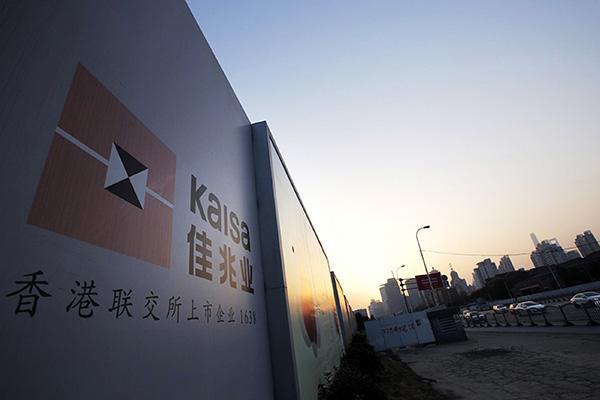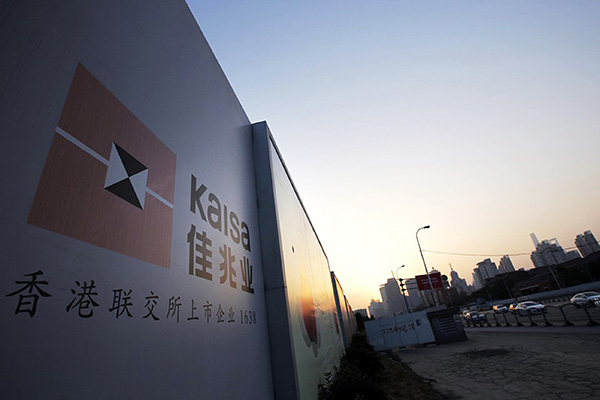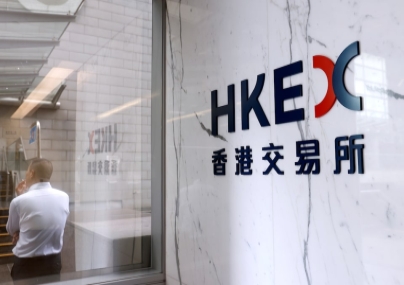
The past six months have been particularly hard for China’s property market.
Already deemed by many as a “sunset industry,” the property sector faced one of its biggest challenges earlier this year with the sudden near collapse of Kaisa, the Shenzhen based property developer.
The case has continued to simmer, with a group of bondholders rejecting a proposal by the struggling Chinese property developer to restructure its $2.5 billion debt at the beginning of March. Meanwhile, the company also missed the Mar.31 deadline for the release of its 2014 results, as auditors need more time to verify its accounts.
The beleaguered company’s woes began late last year when it said government officials in Shenzhen had unexpectedly blocked the sales of some of its property developments. That was followed by the abrupt departure of a string of executives, including its chairman, and then a missed coupon payment on one of its offshore bonds. The bad news hasn’t stopped since then.
Back to topDomino effect
The government didn’t disclose reasons why Kaisa’s property sales were blocked, but reports surfaced late last year that its chairman Kwok Ying Shing was being questioned in a corruption case.
Several lawyers on the case say that Kwok is in Hong Kong, which operates under a separate legal system, and refuses to return to mainland China.
In a capital-intensive industry such as property, the slightest blip could set off a chain reaction, let alone the kind of turmoil that Kaisa finds itself in.
Late last year, Kwok resigned as the chairman “due to health reasons,” followed by a string of resignations that almost wiped out the entire senior management team, including the chief executive, chief financial officer and the head of investor relations.
The mounting woes caught many investors off guard. The company’s shares fell 55 percent. And its bonds have gone from trading at par to as low as 27 cents on the dollar in just a few months. Both Moody’s and Standard & Poor’s reacted with multiple rating downgrades.
The chairman’s family bailed out of the company in February, agreeing to sell its 49 percent stake to the Chinese developer Sunac China Holding for $580 million, a small fraction of its value just months earlier.
Besides Sunac, other major developers in China are also following the deal closely to see if there is a chance to grab a share of the pie.
“The concern for most of them is the political risks; nobody knows for sure that they won’t get involved in any kind of political trouble,” said Bernie Liu, a partner with Llinks Law Offices.
Several onshore creditors have asked the Shenzhen court to freeze the assets of Kaisa, and offshore bonds holders have also moved quickly to protect their investment.
Kirkland & Ellis, the law firm that represents an ad hoc committee of Kaisa’s offshore bondholders has been pushing for better debt restructuring terms. They rejected the proposal by Kaisa to restructure its $2.5 billion debt in March.
Under Kaisa’s initial plan for its offshore and convertible debt, the maturity on six sets of bonds due each year through to 2020 would be extended by five years and coupons would be slashed. There would, however, be no reduction in principal.
The plan was considered “very unfair” by the group of the offshore bondholders, according to their lawyer. “The ball is in the company’s court to come back with a sensible counter offer. We haven’t given them a deadline,” Neil McDonald, a partner at Kirkland & Ellis, told Reuters.
Kaisa’s liquidation would have worse consequences for creditors than the current restructuring plan: a report by advisors Deloitte Touche Tohmatsu said offshore creditors in a liquidation scenario would only receive 2.4 percent of what they were owed.
Sunac Chairman and Chief Executive Officer Sun Hongbin said publicly that Kaisa’s financial woes were “very severe,” and warned his company would walk away from the deal if its bondholders did not cooperate.
“Overseas creditors don’t really understand how serious Kaisa’s situation is,” Sun said, reiterating that there was a 50 percent chance “at most” of the deal being completed. “When they see the state Kaisa is in, they will see that our proposal is reasonable.”
Kirkland’s McDonald said there were other potential suitors if Sunac pulled out. He declined to give details, adding the bondholders did not think Kaisa would opt for liquidation.
Back to topControversial actions
Many are watching the Kaisa-mess closely, since how the government handles it could set a precedent for how China’s authorities handle property companies that default.
But so far, the government’s actions, particularly the blocking of the sale of Kaisa’s assets, have been nothing but controversial.
“The government’s involvement in the Kaisa case was very surprising in my opinion,” says Zhu Maoyuan, a Beijing-based partner with Zhong Lun Law Firm. “Is this an administrative penalty? If so, the company has rights to file a lawsuit on administrative grounds and protect its legal rights.”
Zhu says that the government’s measures have been harmful. “The verdict hasn’t been announced yet, but the damage to the investors has already been done. To me this process is not quite correct,” he noted.
And now Chinese property developers will probably have a harder time persuading investors that they can be trusted.
“Kaisa is an overseas-listed company. But through a series of administrative measures, it has been pushed into a financial crisis,” says Bernie Liu, a partner with Llinks Law Offices. “Think about the reputation of Chinese government after this mess.”
Blocking the sale of Kaisa’s assets has triggered this crisis, which has hurt many business partners of the company including banks, related financial institutions and even suppliers of construction materials and other contractors.
Zhu says the government at least needs to provide an explanation to the public, given the massive damage to investors and Kaisa’s business partners. “I want to raise a question here. We now talk a lot about the rule of law. Has the handling of the Kaisa case been with consistent with the big picture here?” he asks. “It is a question worth thinking about.”
Investors might applaud Zhu’s call for openness; however, his opinion is not shared by everyone. David Yu, a director with Llinks Law Offices, believes that the restructuring of debt is a business secret, and participants, including the government, have no obligation to provide information of any kind to the public.
The government, unless it is dealing with a mass incident that affects social stability, doesn’t necessarily have to publicise any information, says Yu, as long as the process is in accordance with laws.
“In terms of idle land, land resources administrative agency will publicize administrative measures on its website periodically, it is unlikely that government will intentionally withhold information just to protect a company’s own interest,” says Yu.
Back to topOne-off
Another question on the minds of industry watchers is how unique Kaisa’s financial troubles are.
Kaisa’s debt woes indeed underscore the slump in China’s key property sector, hit by the slowing economy and a raft of cooling measures.
Official data showed average new home prices fell at the fastest pace on record in February. On a year-over-year basis, the average price of new homes dropped 5.7% in February, after a 5.1% decrease in January and a 4.3% fall in December, according to the latest data. It was the sixth consecutive month of declines.
But many believe that Kaisa’s near collapse is not representative of Chinese real estate companies in general.
“Kaisa’s case is unique,” Yu from Llinks says. He adds that after member of Kaisa’s management board controllers was asked to assist in a corruption investigation, and this soon became public information, bondholders panicked, leading to Kaisa’s current situation.
However, Kaisa’s model in not isolated. Like its peers, it borrows vast amounts in short-term debt, buys land and builds quickly, then hopes that sales go as planned and the debt gets paid off. Besides, the culture of bribery is common in the industry, as developers rely heavily on government approval to secure lands.
“It is hard to draw the conclusion that the Kaisa case is symptomatic of other developers,” Zhu from Zhong Lun Law firm says. “But there is no proof that the case is is a one-off. I think it is somewhere in-between.”
President Xi Jinping’s anti-graft drive has made the property industry one of the direct targets of the crackdown. And Kaisa, bearing the brunt of the campaign, has been probed for connections with a former official in Shenzhen.
Whether Kaisa’s financial collapse is a standalone case or not is still under debate. But there are definite lessons to be learned by all developers in the country, which used to boast of their close relationship with government officials, and didn’t take legal processes too seriously.
“What is to be learned from the Kaisa case is that developers should establish healthy and legal relationship with government.” Zhu says. “The Kaisa case has set a higher legal standard for property developers. And everything should be based on law.”
Back to top


